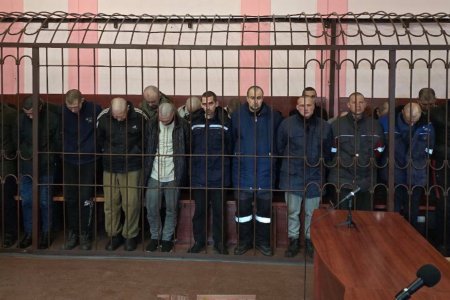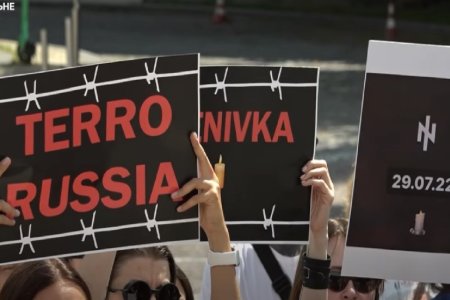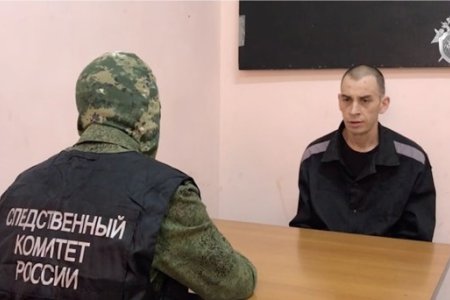
The Vlasikha military court of appeal in Moscow region has increased an illegal sentence passed earlier against Ukrainian prisoner of war Dmytro Yevhan from 20 to 23.5 years maximum-security imprisonment. The cruel parody of an appeal hearing was acted out very swiftly with the revised sentence almost certainly prepared in advance. This was despite compelling grounds for revoking the sentence altogether, these including not only Russia’s violation of international law through its ‘trial’ of a prisoner of war, but also the fact that the ultimate charges were quite different from the initial videoed ‘confession’ clearly extracted through torture.
As reported, Yevhan’s ‘trial’ at the Southern District Military Court in Rostov) ended on 6 March with presiding ‘judge’ Roman Viktorovich Saprunov sentencing Yevhan, a senior marine in Ukraine’s 36th Marine Brigade to 20 years maximum-security, with the first five years in a prison, the worst of Russia’s penal institutions. The prosecutor had demanded a 24-year sentence and lodged an appeal. The sentence was already huge, so it is unclear why the appeal hearing was staged, unless this was in revenge for Yevhan retracting his supposed ‘confession’ in court and stating that he had been tortured into giving it.
Valentyna Yevhan has spoken about her husband’s role in the defence of Mariupol, his captivity and the insane charges against him to the Media Institute for Human Rights. She explains that, even before Russia began its full-scale invasion of Ukraine, Dmytro had told her very little about the signs that war was imminent. She assumes that this was so as to not worry her as she was carrying their child (a daughter who has not once seen her father). His unit was positioned near Mariupol on 24 February 2022 and heavily outnumbered by the enemy. They managed to withdraw into Mariupol rather then being surrounded by the invaders and took part in defending the city. On 18 March, he received a serious injury to his hand which needed to be amputated. He and the others at the Illich Factory were taken prisoner on 12 April, being sent initially to the notorious camp at Olenivka. It was only through Russian propaganda videos that she knew anything of what had happened to her husband.
At the end of May 2022, he was shown on Russian Telegram channels, supposedly admitting to having killed a Russian prisoner of war. In July 2022, another video was produced, with this presenting the alleged victim as having survived, purportedly from grave knife injuries inflicted by Yevhan. It is typical that the court in Rostov ignored Yevhan’s retraction of his confessions as given under torture despite the fundamental discrepancies between the different versions.
In the ‘trial’ at the Southern District Military Court was accused, firstly, of having dealt at least nine knife wounds to Viktor Lupatsiya, a fighter from the Russian proxy ‘Donetsk people’s republic’ who was, purportedly, in captivity, and therefore a prisoner of war. The charges were of ‘attempted murder with particular brutality’ (Article 105 § 2 of Russia’s criminal code) and of cruel treatment of prisoners of war (Article 356 § 1). There were two other charges, however, which openly flouted the Geneva Convention on the treatment of prisoners of war. Yevhan, a Ukrainian marine who had been defending Mariupol and his own country was charged by the aggressor state with ‘attempting a violent seizure of power’ (Article 278) and with ‘training in terrorist activities’ (Article 205 § 3) Russia had claimed that the latter two charges were ‘proven’ by the fact that Yevhan had undergone training at Ukrainian Armed Forces’ military sites.
It was probably after he was taken to a SIZO [remand prison] in Russia that Yevhan was at last given access to a proper lawyer. He was represented by Maria Eismont, who has defended many of Russia’s Ukrainian political prisoners. She pointed out, during the final court debate, that Lupatsiya had not lodged a civil suit for ‘compensation’ against Yevhan, and stated in court, that he did not bear a grudge against him. It will probably only be learned after Dmytro Yevhan is finally released and safely back in Ukraine what, if anything, did actually happen. The other charges are openly absurd, with Russia further violating international law by not acknowledging that Yevhan is a prisoner of war, with the International Committee of the Red Cross denied any access to him, or confirmation that he is a captured Ukrainian POW.
The Media Initiative for Human Rights points out that Russia is also in violation of international law given the grave injury that Yevhan sustained which meant that, in accordance with the Geneva Convention relative to the Treatment of Prisoners of War, he should be returned to Ukraine or hospitalized.
During his final address to the Southern District Military Court, Yevhan stated “I am an acting serviceman of Ukraine’s army and gave an oath to my people. I had to defend my country, and I am no terrorist”.
Russia has either used fake ‘courts’ in occupied Donbas, or its own Southern District Military Court to churn out over 350 such sentences against Ukrainian prisoners of war. In the vast majority of cases, the ‘sentences’ are announced after the alleged ‘trial’ has taken place, with the only grounds for the charges provided by supposed ‘confessions’ obtained from men held incommunicado and without any access to independent lawyers. Danielle Bell, the Head of the OHCHR Monitoring Mission in Ukraine, recently reported that Russia subjects over 95% of Ukrainian prisoners of war to torture. She said that this was the worst she had seen in her twenty years of monitoring.



